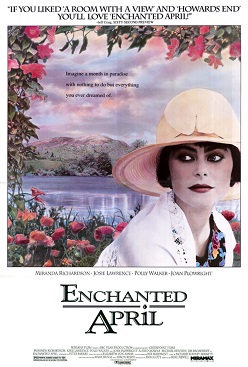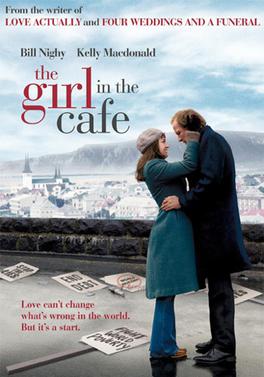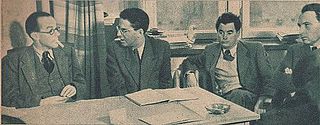Related Research Articles

The United Kingdom has had a significant film industry for over a century. While film production reached an all-time high in 1936, the "golden age" of British cinema is usually thought to have occurred in the 1940s, during which the directors David Lean, Michael Powell, and Carol Reed produced their most critically acclaimed works. Many British actors have accrued critical success and worldwide recognition, such as Audrey Hepburn, Olivia de Havilland, Vivien Leigh, Glynis Johns, Maggie Smith, Laurence Olivier, Michael Caine, Sean Connery, Ian Mckellen, Joan Collins, Judi Dench, Julie Andrews, Daniel Day-Lewis, Gary Oldman, Emma Thompson, Anthony Hopkins and Kate Winslet. Some of the films with the largest ever box office returns have been made in the United Kingdom, including the third and sixth highest-grossing film franchises.

Enchanted April is a 1991 British film directed by Mike Newell. The screenplay by Peter Barnes was adapted from Elizabeth von Arnim's 1922 novel The Enchanted April. It stars Miranda Richardson, Josie Lawrence, Polly Walker, and Joan Plowright, with Alfred Molina, Michael Kitchen, and Jim Broadbent in supporting roles.

Paul Rotha was a British documentary film-maker, film historian and critic.

The Girl in the Café is a British made-for-television drama film directed by David Yates, written by Richard Curtis and produced by Hilary Bevan Jones. The film is produced by the independent production company Tightrope Pictures and was originally screened on BBC One in the United Kingdom on 25 June 2005. It was also shown in the United States on cable television station Home Box Office on the same day. Bill Nighy portrays the character of Lawrence, with Kelly Macdonald portraying Gina. Nighy and Macdonald had previously starred together in the 2003 BBC serial State of Play, which was also directed by Yates and produced by Bevan-Jones. The Girl in the Café's casting director is Fiona Weir who, at the time, was also the casting director for the Harry Potter films, the last four of which Yates directed.

Peter Kosminsky is a British writer, director and producer. He has directed Hollywood movies such as White Oleander and television films like Warriors, The Government Inspector, The Promise, Wolf Hall and The State.
This Little Life is a 2003 TV film drama starring Kate Ashfield, Peter Mullan and Linda Bassett. The story follows the life of a married couple following the premature birth of their son.

Frank Charles Spotnitz is an American television screenwriter and executive producer, best known for his work on The X-Files and The Man in the High Castle. Spotnitz is also the chief executive officer and founder of Big Light Productions, a London- and Paris-based production company, which specializes in international television series, including drama, comedy and documentaries. Spotnitz's career includes creating, writing and producing series with networks, cable, streaming and other broadcast platforms around the world.

BBC Film is the feature film-making arm of the BBC. It was founded on 18 June 1990, and has produced or co-produced some of the most successful British films of recent years, including Truly, Madly, Deeply, Alan Partridge: Alpha Papa, Quartet, Salmon Fishing in the Yemen, Saving Mr. Banks, My Week with Marilyn, Eastern Promises, Match Point, Jane Eyre, In the Loop, An Education, StreetDance 3D, Fish Tank, The History Boys, Nativity!, Iris, Notes on a Scandal, Philomena, Stan & Ollie, Man Up, Billy Elliot and Brooklyn.
Michael James Rowland is an Australian film director.

Basil Wright was a documentary filmmaker, film historian, film critic and teacher.
Iain Forsyth and Jane Pollard are British artists and filmmakers.
Charles Joel Saunders was an English film director and screenwriter who began in the industry as a film editor, and who also contributed to television. He was the brother of the theatrical producer Sir Peter Saunders.

Steven Knight is a British screenwriter, film and television producer and director. Knight wrote the screenplays for the films Closed Circuit, Dirty Pretty Things, and Eastern Promises, and also wrote and directed the films Locke and Hummingbird.

The Crimson Circle is a 1929 British-German crime film directed by Frederic Zelnik and starring Lya Mara, Fred Louis Lerch, and Stewart Rome. The film is an adaptation of the 1922 Edgar Wallace novel The Crimson Circle in which Scotland Yard detectives battle a gang of blackmailers. A previous UK version was filmed in 1922.
Radical Illustrators was a one-off issue of Illustrators magazine. It was edited by George Snow and Robert Mason and published by the Association of Illustrators in England in 1981. This issue of Illustrators magazine is notable capturing a movement in the art form of illustration, in its reactionary and rejection of popular mainstream illustration of the time.
The Man in the High Castle is an American dystopian alternate history television series created for streaming service Amazon Prime Video, depicting a parallel universe where the Axis powers of Nazi Germany and the Empire of Japan rule the world after their victory in World War II. It was created by Frank Spotnitz and produced by Amazon Studios, Ridley Scott's Scott Free Productions, Headline Pictures, Electric Shepherd Productions, and Big Light Productions. The series is based on Philip K. Dick's 1962 novel of the same name.
Craig William Macneill is an American film director, writer, and editor. His feature film Lizzie, starring Chloë Sevigny and Kristen Stewart, premiered in the U.S Dramatic Competition section at the 2018 Sundance Film Festival. The film was acquired by Roadside Attractions and Saban Films and released theatrically in the fall of 2018. Macneill's first feature film, The Boy, premiered in the narrative competition at the 2015 SXSW Film Festival and which was also based on a previous short film he co-wrote, directed, and edited titled Henley, which screened in competition at the 2012 Sundance Film Festival and won the grand jury prize for "Best Short Film" at the Gen Art Film Festival and Clint Eastwood’s Carmel Film and Arts Film Festival. In 2016.
Headline Pictures is an International Emmy-winning British film and television production company founded in 2005 by BAFTA nominee Stewart Mackinnon, former BBC Head of Drama Mark Shivas and screenwriter Kevin Hood. The company is now part of the UGC group.
Peter and Wendy is a 2015 television film made for ITV in the UK. It was written by Adrian Hodges, directed by Diarmuid Lawrence and produced by Stewart Mackinnon and Christian Baute, Headline Pictures.
References
- ↑ "Quartet". Box Office Mojo.
- ↑ "Stewart Mackinnon". IMDb.
- ↑ "Stewart Mackinnon: Ruptured and Remade". Design Observer. 4 December 2011.
- ↑ "Manifesto" (PDF). Ark No.51. 1973. p. 6.
- ↑ "A Manifesto for Illustration". Visual Communication - Communication Design Department Blog / Glasgow School of Art. 19 January 2010.
- ↑ "WAR GAME 1965 Peter Watkins, Kathy Staff, Michael Aspel UK 20x30 POSTER". Web Archive. Archived from the original on 25 August 2017.
{{cite web}}: CS1 maint: bot: original URL status unknown (link) - ↑ "Stewart Mackinnon: Ruptured and Remade". Design Observer. 4 December 2011.
- ↑ "The other day in publishing history: 'Oz' Underground magazine editors jailed for obscenity, 1971". Past Tense. 7 August 2016.
- ↑ "Radical Illustrators" (PDF). Illustrators Magazine. 1981.
- ↑ "Because I am King (1980)". BFI. Archived from the original on 12 June 2018.
- ↑ Willet, John (2015). Brecht in Context. Bloomsbury Publishing. p. 210. ISBN 978-1474243087.
- ↑ "Ends and Means (1983)". BFI. Archived from the original on 12 June 2018.
- ↑ "Trade Films". Companies House.
- ↑ "Stewart Mackinnon: Ruptured and Remade". Design Observer. 4 December 2011.
- ↑ British Universities Film & Video Council
- ↑ "Paul Rotha, 1982". BFI. Archived from the original on 12 June 2018.
- ↑ "Trade Films". BFI. Archived from the original on 10 June 2018.
- ↑ "Northern News Reel no.9". BFI. Archived from the original on 12 June 2018.
- ↑ Anderson, Alison (2013). Media, Culture And The Environment. Routledge. p. 196. ISBN 978-1317756552.
- ↑ Stuart Jeffries (12-09-2018) The revolution was televised: why didn’t the radical TV of the 1980s last? The Guardian
- ↑ "Chronology of Disability Arts" (PDF). Arts Council England. p. 29.
- ↑ "1988 FAQ". Shape Arts.
- ↑ Moran, Albert (2005). Film Policy: International, National and Regional Perspectives. Routledge. p. 219. ISBN 1134859988.
- ↑ "Chronology, Disability Arts 1976-1989". Disability Arts Online.
- ↑ Press Office (18-12-2006) Great Ormond St entrusts film & tv rights to Peter Pan In Scarlet to BBC Films, UK Film Council & Headline Pictures BBC Press Office
- ↑ (17-06-2004) Film company's prestige award The Journal
- ↑ Fiona Fraser (31-05-2002) New Common Features production for BBC2 C21
- ↑ "This Little Life Awards". IMDb.
- ↑ Geoffrey Macnab (03-01-2013) Headline Pictures co-founder Stewart Mackinnon talks to Screen Screen Daily
- ↑ Clarke, Stewart (14 November 2019). "'The Man in the High Castle' Producer Stewart Mackinnon Launches Circle Pictures". Variety. Retrieved 24 August 2021.